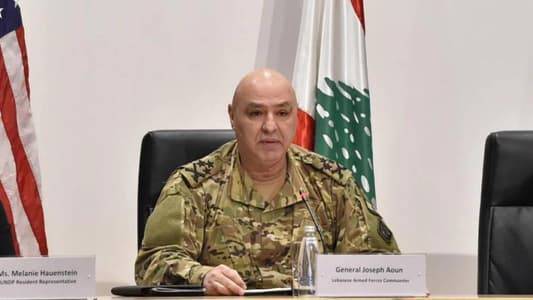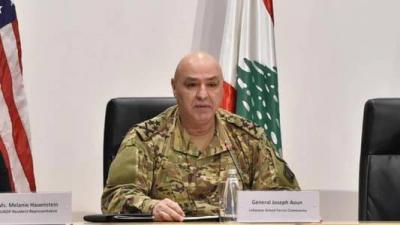Now more than ever, the name of Army Commander Joseph Aoun is being circulated for the presidency. Periodically, there are those who lean towards his favor and speak of Arab and international support for his arrival. The initial sparks often come from individuals close to or part of the media machinery aligned with the army's leadership. It is no longer a secret that the names of the Army Commander and Minister Ziad Baroud were discussed in the tripartite Paris meeting (Saudi-French-American) months ago. His nomination has French and American approval, as well as Qatari and Egyptian support at the Arab level, while Saudi Arabia's position has yet to emerge.
Locally, until recently, his nomination faced the obstacle of not having a parliamentary bloc that seriously endorses him. The "Shiite duo" is not enthusiastic about his accession, and "the Forces" were the first to nominate him before adopting the nomination of Michel Moawad in the voting booths. On the Christian side, "the Free Patriotic Movement" has expressed opposition to the extent of a disconnect. The new and surprising position was voiced by Progressive Socialist Party leader Walid Jumblatt, who opposed repeating the army's experience in the presidency, before changing his stance and visiting Ain al-Tineh, carrying the banner of General Aoun after a delegation of his party's MPs paved the way in Bkirki.
At Ain al-Tineh, his proposal was met with a clear and explicit response. Parliament Speaker Nabih Berri did not follow his ally in the direction he wanted. While the "Hezbollah" delegation responded to Jumblatt's proposal by saying they support whoever is agreed upon Christian-wise, Berri quickly asked his friend, "Where did you get this from?" Jumblatt hopes the electoral process will pass with any candidate agreed upon, considering that the election of the Army Commander depends on the approval of "Hezbollah" or the Shiite duo in general. Those familiar with him liken his announcement to a noise bomb.
In analyzing the dimensions, one can understand the positive atmosphere being promoted as a response to the attack by "Free Patriotic Movement" President Gibran Bassil against General Aoun and to spread favorable conditions for his chances ahead of the upcoming Paris meeting. However, in reality, his election will not be that simple for several reasons, including external matters related to a compromise that has not yet matured amid the flames along the Iran-Yemen-Iraq line, and domestically, his election requires a constitutional amendment. That bitter cup is something Berri is not prepared for under normal circumstances, especially as it opens the door to extending the term of the Director-General of General Security, Major General Abbas Ibrahim, which has returned to square one after previous attempts failed.
A survey of the atmospheres among various political parties reveals that Joseph Aoun's nomination will clash with Bassil's opposition; "Hezbollah" may not support him directly, but it will not adopt his nomination. Well-informed political sources indicate that "Mardai" leader Sleiman Frangieh remains the "duo's" candidate, but this does not close the door on discussing other Christian options, especially since Frangieh's nomination faces regional and international forces considering him a candidate of "Hezbollah" and Syria.
Among the names being circulated are former Minister Jihad Azour, banker Samir Assaf, and former Minister Ziad Baroud. If consensus is not reached on Azour, Joseph Aoun's nomination will be brought up for discussion. The conclusion of his term after two years requires a constitutional amendment for his election, which is rejected by several parliamentary blocs to this day. "Hezbollah" is considered one of the forces that vehemently oppose electing the Army Commander as president. Until not too long ago, the "Party" would tell inquirers that it would not repeat the "mistake" of electing Michel Sleiman again, but today's circumstances might differ from the past. "Hezbollah" no longer has the same influence over political forces as it did previously. It also insists on resolving the economic and social crisis and closing the chapter on the presidency with a candidate who is accepted by Christian forces and is not provocative or antagonistic to the resistance.
The issue is not as simple as previously stated, other sources argue, noting: the presidency is not settled for any candidate, and what confirms the Army Commander's arrival is a major security shake-up in the country that forces everyone to accept his choice. They further noted that his nomination is still a point of contention. It might be media hype or a bubble, but the truth is that everyone is troubled in naming an alternative to their candidate. At a moment chosen by Jumblatt, without informing him in advance, he said that the nomination of MP Michel Moawad has exhausted, and he may come out to say a similar formula about General Aoun's nomination as long as it does not receive the duo's approval. However, the very proposal has stirred stagnation and opened doors for exploring alternatives. But the most serious thing said is linking the Army Commander's election to significant security developments, raising concerns due to the dramatic developments related to the port investigations and the rift within the judicial body.




